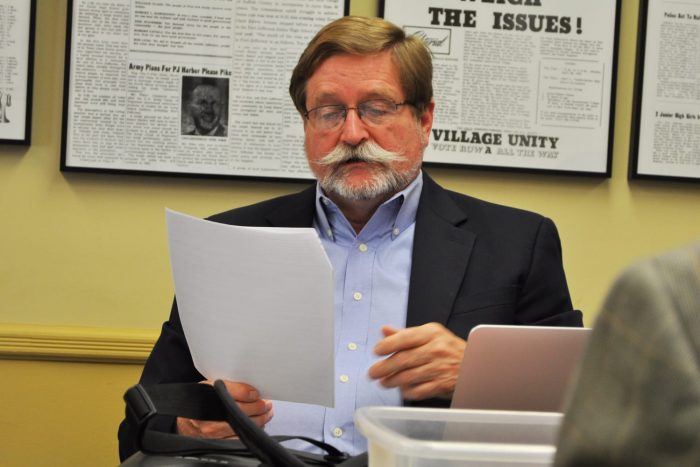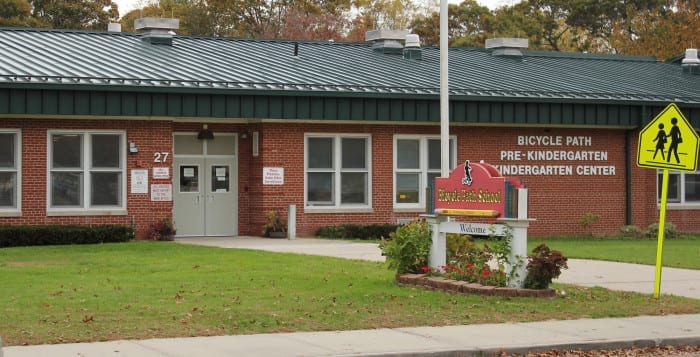After eight years of service on the Port Jefferson Village Board of Trustees, Bruce Miller will leave office after this week.
Miller, who unsuccessfully sought a fifth term as trustee in this year’s election, will leave office on July 4. He will be succeeded by Lauren Sheprow.
In an exclusive interview with Miller, the outgoing trustee reflected upon his time in village government, his greatest challenges and his hopes for the future.
Miller congratulated the winners of the race, saying, “I would like to congratulate the two people that did win, Rebecca [Kassay] and Lauren. I hope they will do good things for the village.” He added, “Obviously, I’m disappointed that I didn’t place in the necessary top two, so I’ll be looking for other things to do. Any assistance that I can provide to the new trustees or the mayor or anyone else associated with the village government, I would be glad to provide.”
Writing his own story
Miller highlighted several projects that he believes represent the core of his contribution to the village. He said the projects he focused on were those that required long-term vision, carried out over many years.
“Certain things take a long time to accomplish,” he said. “With the green energy aggregated solar, we had to get laws passed in order to have it permitted on Long Island as LIPA resisted.” Miller added that the village could sign up for this program right now, which would reduce utility costs for village ratepayers.
‘I worked in areas kind of on my own. I made my own story.’
— Bruce Miller
The Long Island Rail Road was another trademark issue for Miller. He believes that after years of persistence, funds are finally being made available to improve the rider experience and expedite services. “The money is there,” the retiring trustee said. “There’s $10 billion coming to the MTA and we need to work with our legislatures to ensure that we get a piece of that.” He added, “In the Army we used to have the expression, KISS: Keep it simple, stupid. To the Long Island Rail Road, I would say just streamline this thing and do what you have to do to get us a better ride.”Miller will be leaving office with “some ideas on the drawing board.” He said that if he had been reelected, he would have explored the possibility of annexing the Lawrence Aviation property and the houses between the property and Sheep Pasture Road.
“There’s 40 acres of open space there where we could declare parkland,” he said. “That would resolve a lot of issues that we have.”
Another idea Miller had was to consider the possibility of constructing underground parking in the Dutch model.
Working as a trustee, Miller said he encountered numerous difficulties along the way. A contrarian and independent voice, Miller said he was often in the minority on many of the major issues.
“I was a minority trustee,” he said. “It’s a very low-leverage situation. I tried to be supportive of the mayor and the priorities of the majority, but in some cases I could not do that and resisted a lot of that.” He continued, “I worked in areas kind of on my own. I made my own story.”
Tradition vs. transformation
Miller said that while much of the village’s character remains unchanged since his first term, the village has undergone some profound changes, most noticeably in Upper Port.
“If you look at the four blocks south of Sheep Pasture and North Country Road, there’s change going on there and there will be a lot more,” Miller said, adding, “The area was pretty blighted and the people who owned the property there allowed it to deteriorate in order to extract consideration for larger zoning, which they got.”
Miller also acknowledged that much of the development in Upper Port is made possible through Industrial Development Agency subsidies, “which means the apartments pay very little taxes, so there’s a great incentive for building and not much desire on the part of the developers to give back,” he said.
One area Miller had hoped developers could compromise on was architecture, which he believes should reflect the New England and maritime traditions of the community and create a sense of continuity between uptown and downtown.
“I had advocated that we use a Victorian, maritime kind of architectural structure on these buildings to tie them in with the downtown, so that we are one village,” he said, adding, “Making a village of quality is of interest to the residents because it improves their property values and their sense of being.”
Miller said he understands the sense of urgency to develop those areas. However, he still believes the developments should be guided by greater oversight from the village. “We’re not looking toward the future in terms of developing an ambiance that is on a par with Cold Spring Harbor or Southampton,” he said.
Leaving office
Miller’s message to the incoming board is to keep his priorities in mind as they are important. Aside from the duties that preoccupy board members from day to day, he said considerable forethought and long-term planning are also necessary.
“There’s a lot that goes on in the village that needs to get done, but we need to get beyond that and make substantial improvements in what we’re focusing on,” he said. “I would hope that they would pick up some of these issues that I had started with.”
He also asked that the trustees and the Planning Board apply greater pressure to real estate developers, who “are getting an extraordinary deal.”
Miller said he favors the construction of condominiums over one-bedroom apartments, which he says can also help offset declining student enrollment in the school district.
When asked if he had any regrets about his time in village government, he replied, “No, I don’t have any regrets. I really see this as a calling and it improves me. I like to contribute. I enjoy putting my energy and creativity into enterprises benefiting the community, and I will continue to do so.” He added, “I just see the value in contributing to and helping my fellow citizens and trying to express a better vision for their future.”






